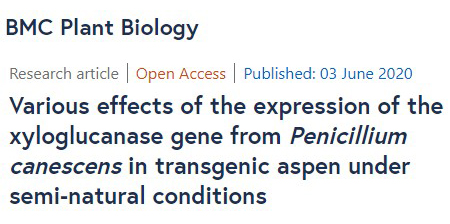Press-room / news / Science news /
Transgenic aspen plants (Populus tremula) with the expression of recombinant xyloglucanase sp-Xeg show an increased growth rate, altered composition and properties of wood, and the phenotype of the plant as a whole
Scientists from the Group of Forest Biotechnology IBCh RAS obtained the transgenic aspen with acceletated growth, a modified carbohydrate composition and a slower rate of decomposition of wood.
Wood formation is an extremely complex process, controlled by more than 40,000 genes. The role of most of them is still unknown. Changes in the lignification process are immediately apparent in the tree's phenotype. At the cellular level, wood is nothing but lignified cell walls. They are constructed from three main structural biopolymers-cellulose, hemicellulose and lignins. Each of these polymers has specific functions in the cell wall. The main component of hemicellulose is xyloglucans, which form short cross-links between long cellulose filaments. The more stitches, the lower the elasticity of the cell wall. Scientists suggested that partial, rather than excessive, hydrolysis of xyloglucans may affect the elasticity of the cell wall, and indirectly the growth rate of the tree. In transgenic models of aspen (Populus tremula), they have shown that superexpression of recombinant xyloglucanase from the fungus Penicillium canescens leads not only to hydrolysis of cell wall xyloglucans, but also is accompanied by a complex of changes in the phenotype. The content of cellulose in wood is increased, the shape of the leaf blade is changed, growth is accelerated, the formation of the G-layer in the cell wall is increased, the carbohydrate composition of wood are changed, as a result, the wood began to decompose more slowly. It is important to note that these changes were maintained in semi-natural test conditions. The work is published in BMC Plant Biology.
june 8, 2020



